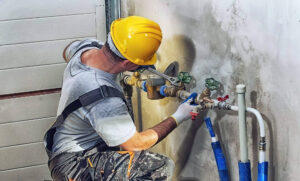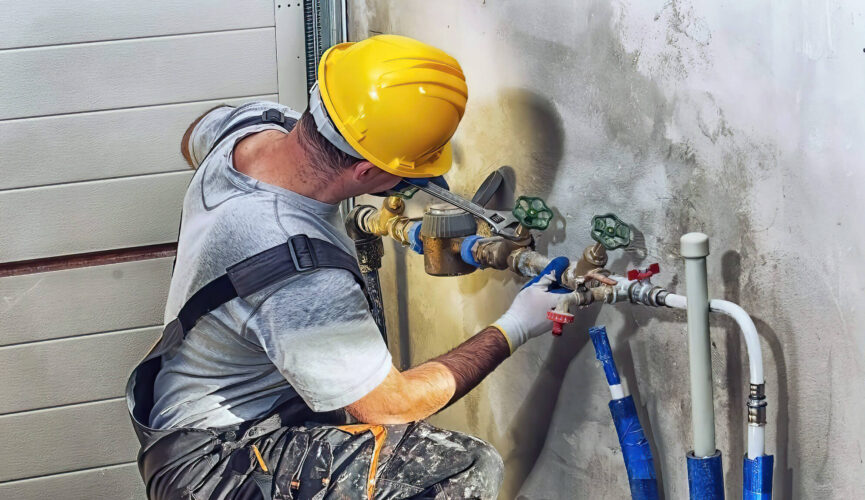Plumbing is the system of pipes, fixtures, and appliances that conveys water for various uses. It requires knowledge of building codes and regulations and an understanding of how different materials affect the functionality and durability of a plumbing system.
In addition to handling water supply, plumbing also carries waste away from buildings. This function is crucial to ensuring the health and safety of individuals and communities. Visit https://freedomplumbingnj.com/ to learn more.
Plumbing is the system of pipes, fixtures, and appliances that facilitate water supply and waste disposal in residential, commercial, and industrial settings. Plumbers install, repair, and maintain these systems to ensure they function correctly. This career requires knowledge of blueprints and building codes and the ability to identify and troubleshoot problems. Plumbers also install and repair fixtures, such as sinks, toilets, bathtubs, showers, water heaters, and faucets. In addition, they may use specialized tools to repair broken or leaky valves or drain traps.
The main functions of a plumbing system are to provide a means of potable water, remove waste, and heat and cool a building. The plumbing system in a home or business includes piping that transports water from sources such as rivers and lakes to the homes and businesses that use it. The piping is often made of copper or plastic, and it is designed to withstand high levels of pressure and other environmental factors that could damage or degrade it.
A plumbing system also includes a drainage system that carries away waste water and sewage. This system consists of pipes that connect to the drains in fixtures and then to the sewer line or septic tank. The drainage system must include vents to prevent backflow and a system of traps that retain a small amount of water to prevent foul odors and slow drainage.
The plumbing industry sets standards for the materials and workmanship of its products. These standards ensure that consumers get a product that will last for years and remain safe for its intended uses. Plumbing manufacturers must submit their products to independent testing laboratories and certification agencies to make sure they meet the appropriate standards before they are sold to consumers. The standards are based on a variety of factors, including material strength, corrosion resistance, toxicity, and sustainability. In addition, plumbing fixtures must be designed and constructed to allow for easy accessibility for maintenance and cleaning. This is important to prevent the buildup of dirt and debris in the system, which can cause clogs and other problems.
Maintenance
Plumbing systems require regular inspections and maintenance to ensure safe and efficient operation. Plumbers often use specialized tools to test for leaks, identify potential problems, and repair or replace pipes and fixtures. They also may inspect sewer lines and drains to ensure proper function and prevent blockages. Some plumbers install and repair gas lines, as well.
Plumbers are able to work on a wide range of plumbing systems and fixtures, including kitchen sinks and faucets, bathtubs, toilets, showers, dishwashers, water heaters, and more. They are also trained to work on various types of heating and cooling systems, including boilers and furnaces. In some cases, plumbers are responsible for maintaining a building’s entire water system, including the distribution lines, heating and cooling equipment, and waste management systems.
When installing new plumbing, they follow blueprints and building codes to properly place and connect piping, fixtures, and appliances. They are skilled at using hand and power tools to perform their job duties. When repairing or replacing existing plumbing, they take into account factors like water pressure, temperature fluctuations, and the amount of use the fixture will get to determine if it needs to be replaced or repaired.
In residential settings, plumbers are usually called to fix problems with bathtubs, showers, toilets, faucets, sinks, garbage disposals, and other kitchen and bathroom fixtures. In some cases, they may be asked to upgrade a home’s water fixtures to improve efficiency or reduce costs. Plumbers are also often hired to work on large-scale water projects, such as installing irrigation systems and water treatment plants.
A plumbing system is essential to the health and safety of a household. Without it, households would face issues like flooding, contaminated drinking water, and poor sanitation. Luckily, most plumbing problems can be prevented with routine maintenance. Make sure to schedule an annual checkup with a qualified plumber and listen to the advice they give you. Taking simple steps, like cleaning your drains regularly with vinegar and baking soda, can help keep them clear of clogs and debris. It’s also a good idea to have your sewer line snaked every two years to prevent blockages and backups.
Repair
Whether you have a small leak or a clogged drain, plumbing repair can save you money and prevent damage to your home. Plumbers use a wide range of tools and supplies to unclog pipes, fix broken fixtures, or replace worn out parts. They can also advise you on the best energy-efficient appliances for your home. You can do some plumbing repairs on your own, but for more complex issues or if you are unsure what to do, it is always best to call a professional.
Most plumbing problems can be prevented by reading and following the manufacturer’s instructions. This will help you avoid common plumbing repair issues like clogs, water pressure changes, and improper installation. A regular inspection by a qualified plumber can also ensure that your plumbing system is working properly.
Leaking hoses, pipes, and fittings can be repaired with slip couplings that snap over the leaking joint. This quick and inexpensive DIY solution works for any type of pipe material and is up to code. You can also use a hacksaw to cut off the old fixture and remove it from the line, then replace it with a new fixture.
If you have a stuck pipe, first try to loosen it with pliers or a wrench. If that doesn’t work, you can try to apply heat with a hair dryer or propane torch (with caution to protect your skin and surroundings). If the stuck piece or nut still won’t move, then it may be time to call a plumber.
A leaking toilet can cost you up to 22 gallons of water per day, so it is important to fix it as soon as possible. It can also cause serious water damage to your house and lead to mold growth, which is hazardous to your health. If left undetected, a leaking toilet can even cause structural damage to your home.
Most people don’t realize that their sewage systems are connected to their plumbing systems until something goes wrong. Sewage systems are designed to take waste and sewage away from homes and businesses, but they can become damaged by tree roots, accidents, or natural disasters. When this happens, a plumber will need to inspect the sewage system and make the necessary repairs.
Replacement
Plumbing is an important aspect of civil engineering that focuses on the transmission and distribution of water and waste materials. It encompasses pipes, drains, valves, fixtures and other apparatuses that convey fluids to and from various points in a building or structure. This system of conduits ensures that water is available for consumption and that waste materials are safely removed, preventing the buildup of harmful bacteria, viruses and other contaminants that can cause health hazards and structural damage. There are several ways to determine whether your home’s plumbing requires replacement, including discolored water, clogged pipes and insufficient or slow drainage. In addition, some older plumbing may contain lead, a toxic material that should be replaced as soon as possible.



